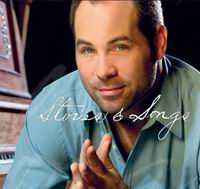Storytelling is a lost art.
Although the communication form of choice during ancient times—Jesus himself greatly favored it when he taught the multitudes—the conventions, inventions, and formulas of the modern age unceremoniously dethroned storytelling as the preferred vehicle for conveying truth.
Fortunately, Mark Schultz knows better.
Of course the title of his highly anticipated third album, Stories and Songs, says something about Schultz’s penchant for putting memorable parables to music. But as he’s proven with his string of incandescent, chart-topping tunes from his first two releases (Mark Schultz, 2000; Song Cinema, 2001), there’s a great deal more churning below and beyond his lyrics and melodies than any album title could possibly convey.
“For my first two records, all my songs were coming from my experiences—and I was either recording or touring,” Schultz, 32, notes. “But for this record, I got to spend a lot of time back home reconnecting with people who are important to me. This album’s all about the depth of relationships.”
With a year off under his belt that recharged his spiritual batteries, Schultz went for broke, meticulously crafting the 10 new tunes on Stories and Songs with layer upon layer of rich complexity.
Gut-wrenching trials. Incredible triumphs. At once personal and universal themes. Humor and insight. Miracles. Then after hitting it off famously with legendary producer Brown Bannister, Schultz spent countless hours in the studio perfecting every verse and chorus, every guitar lick and string arrangement, every vocal stack, jot, and jam, until each track was filled with the kind of verve and depth that eclipses everything Schultz has heretofore created.
Schultz points to a pair of seminal books he dog eared and highlighted to death—Wild at Heart (John Eldredge) and The Silence of Adam (Don Hudson)—as prime-moving forces in his life…and the new record. Their messages—written specifically to men in the church—profoundly changed Schultz’s self-perception, as well as the way he feels God perceives him.
“I always used to want validation from other people, to make other people like me,” Schultz reveals, “but one of the big differences this year is that I finally learned to accept God’s validation. You ride a roller coaster otherwise, and it’s tiring to keep the plates spinning all the time.” (This is the anchor theme to “It’s Been a Long Time,” a new Beatlesque ballad that Schultz fills with soaring harmonies and pulsating, melodic strings.)
Then there’s the lesson from Wild at Heart and The Silence of Adam that hit him perhaps the hardest: “So many men place work before time with their wives and families,” Schultz explains. “And it’s because they know they can win at work. But when they’re faced with providing emotional needs for their wives and kids, that’s terrifying!” This revelation not only inspired a new song (a devastating tearjerker called “Do You Even Know Me Anymore,” written in the vein of “Cats in the Cradle”), it also nudged Schultz to plan on using his concert venues as preshow prayer chapels where men can be ministered to.
After periods of fasting—another new habit Schultz picked up during his season of internal transition—he became awakened to people around him who’d been deeply wounded and needed healing. People who “needed their hearts back,” he notes.
“I was meeting with a friend of mine—a really successful guy who appears to have it all together. But as we talked, I learned that a part of him is still a 14-year-old boy whose father said he wouldn’t amount to anything. He told me, ‘I’m still waiting for my kids to turn out horrible and for my wife to leave me and for my business to fail.’ When I assured him that he’s a man of God, he was weeping and saying, ‘Please keep telling me that.’ I really want to help people discover where those wounds are so they can heal.” That conversation helped spawn the soaring, sunny “You are a Child of Mine,” a musical manifestation of God’s love penetrating the thick, dark cloud that often find surrounds us and pulling us back into his light.
That’s how it went during Schultz’s year sabbathing—conversation after conversation, page after page, prayer after prayer. And just about every day Schultz would retreat to a music room he fondly calls “The Chapel” at the First Presbyterian Church in Nashville and write and compose for hours on end. (Believe it or not, Schultz writes songs only at The Chapel—he won’t even attempt tunesmithing at home. “All my songs were born in that room at the church,” he reveals. “For me, it’s like a little well. I just dump my bucket in there and usually come up with something.”)
Two wildly different tunes from Stories and Songs—“Letters from War” and “Running Just to Catch Myself”—are powerful, back-to-back examples of the top-shelf insight and creativity Schultz seems to gain in that room.
“Letters from War,” on one hand, is an ebbing and flowing musical poem that recreates the powerful letters Schultz was reading one day, written to his great grandmother from her son who, at the time, was overseas serving during World War II. The drama in Schultz’s real-life lyrics is far more poignant than in most war movies.
You don’t get much of a chance to reflect before Schultz grabs the bull by the horns and lays out “Running Just to Catch Myself,” a crazy, caffeinated tune that humorously reflects on the pitfalls of 21st century living. But despite its everything-but-the-kitchen-sink musical approach—Freddie Mercury himself may have written it as a follow-up to “Bohemian Rhapsody”—the zany verses and choruses hold deep meaning that’ll force listeners to study the song for a spell.
In the end, Stories and Songs represents who Schultz is at the core. Fun. Real. Full of depth. And, most of all they invite us to step out of own stories where we are the focus and into God’s larger story, where we can discover what we will do with the time that is left.
